Anti-Asian Violence Erupts
Alexis Joy Viloria
A year after the COVID-19 virus started to wreak havoc on our country, another virus continues to make its mark on America with a target of its own. With unwarranted associations between COVID-19 and Asian-Americans, tensions within the Asian American community have continued to rise as some Americans craved a group to blame. From the racist rhetoric spit out at the start of the pandemic dubbing the coronavirus as the “Chinese virus” to the violence Asians are facing nationally, its become worse for the Asian-American community.
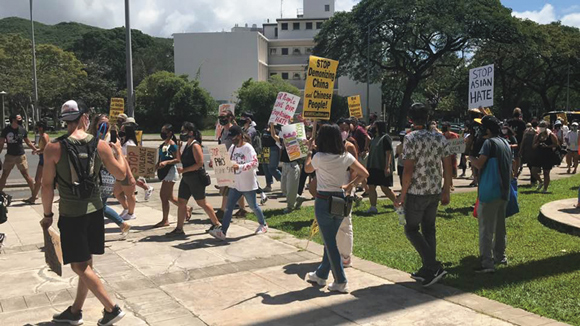
Photo: Wayland T. Quintero
America, now ridden with Asian hate crimes, has shifted in the eyes of many from the land of opportunity to the land of fear. To be treated with such violence based on race is something nobody ever wishes to face. Unfortunately, in recent times, that nightmare has become reality. Witnessing the brutal attack and murder in San Francisco of 84-year-old Vicha Ratanapakdee from Thailand to the violent shooting that led eight Asian women in Atlanta to their deaths to the brutal assault on an elderly Filipina in New York on her way to church during Holy Week, nothing can contain the fear the Asian American community has for their own lives and loved ones alike.
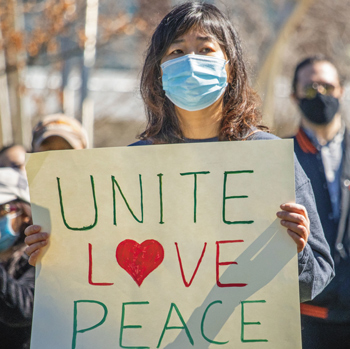
Photo: Paul Becker1999 at https://flickr.com/photos/21426642@N07/51058557473
Living in a place so ingrained with so many cultures including heavy Asian influence like Hawai‘i, many locals can’t even start to comprehend the brutality and hate Asians on the mainland are facing. Three Asian Americans with local ties process their encounter with the events recently unfolded due to hate towards those of Asian descent.
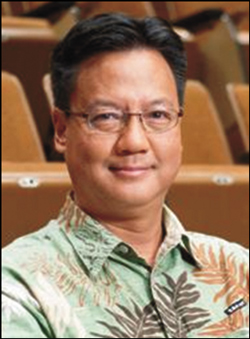
Photo: Hale Makua Health Services
Wesley Lo, CEO of Hale Makua Health Services shares his take on the recent aggression towards the Asian American community. As the violence on Asians does not exclude vulnerable groups like elders, it’s hard to witness the brutal acts conducted by those possessing such hate. To this hate though, Lo pays homage to the blessing it is to have a tight-knit and supportive community full of diversity. “My initial thoughts were that I am blessed to live in Hawai‘i where we are a ‘melting pot’ and people are not judged by their color or race and we embrace our differences. I feel blessed that we live in a place and I am surrounded by people that look to support our community as opposed to tearing our community apart,” Lo says.
What is happening now though, is not new to Lo who had his bouts with Asian-targeted racism even in past times before the COVID-19 virus. “To some extent, it reminded me of my past when I attended college on the mainland in the 1970s. I found that racism existed in those days. Most people I interacted with were good people with community-based values but there were always a few that had feelings of racism and I felt sorry that they had to live their lives like that.”
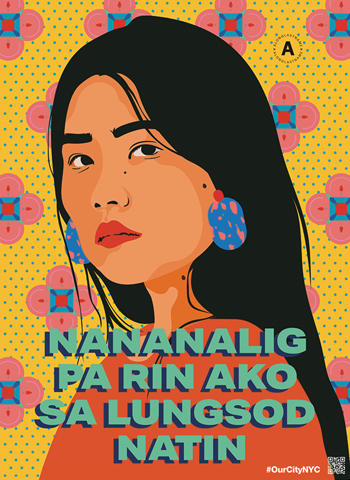
Photo courtesy nyc.gov
While some find themselves pondering the reason behind recent events, Lo has his own suspicions of the foul motives of many attackers. “I suspect that many of these people have insecurities about their lives and feel that life has been unfair to them.” Lo attributes the attacks to the ignorance of attackers in response to the hardships they face. “Accordingly, they look to blame people for the hardships that they face as opposed to finding solutions to their problems or issues.”
In order to curb the effects of Asian hate and prevent violence toward Asians, Lo says the power possessed to stop the hate is in one’s ability to control their behavior and solidarity with other racial groups. “I think that the only thing we can control is our own behavior. We must not let ourselves be brought to the level of many of the people who have anti-Asian views and then start treating them similarly or casting judgments on other ethnicities or races.” To Lo, in the course of action, it’s crucial to remain a strong example to follow even in the worst of times. “While there is an uptick in violence, the worst thing we can do is start making broad generalizations of others.”
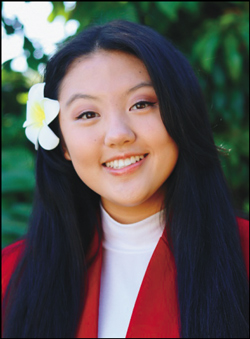
Photo courtesy Wesley Lo
Lo’s daughter Noelle, a Junior at Maui High School, also shared her thoughts on anti-Asian violence occurring in the country. Social media plays a crucial role in the lives of today’s youth. While social media has its own problems, it can also act as a lifeline to spread awareness about current events.
In the context of anti-Asian violence, Noelle recognized how useful social media is in spreading awareness about the inequality faced by America’s Asian community. “Social media is truly a powerful tool. Some take it for granted but the power it has is incredible. Social media brings to light the situations.” With much of the anti-Asian violence not being represented in the media, many wouldn’t even know about the cruelty the Asian American community is facing at this point in time. “Teens wouldn’t have been as educated or even known about these topics if it wasn’t for social media. It’s a step in the right direction. Truly educating our kids and showing them real life, not sugar-coating,” Noelle says.
As the creator of a benefit concert to raise funds for the NAACP Legal Defense Fund after witnessing the brutality faced by the Black community, Noelle is no stranger to the fight toward racial equity. To fellow members of the Asian American community, Noelle leaves a strong message about holding those who committed the crimes witnessed accountable. “We need to have consequences. So many of these stories have killers running free, abusers getting no punishment. All because they’re not of color or they had a bad day. Punish a criminal for being a criminal.”
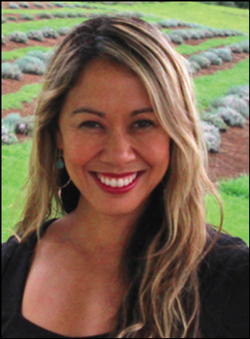
Photo courtesy Dani de Jesus
Former Maui High School teacher turned filmmaker Dani de Jesus spoke about her own encounters with the fear Asians on the mainland are living within these times. Back at the start of the pandemic during the first spike in hate towards the Asian community, de Jesus states her initial emotions in response to the situation were of anger. To de Jesus, the response was prompted by the ease in figuring out the source of the hate the community was facing. “From the rhetoric of President Trump, the tie was so easy to make. He was saying horrible things about the origins of the virus and people were reacting to that.” Many of those reactions, of course, were of mal intent towards Asians as de Jesus suspects they were looking for someone to pin the blame for the halt in their lives. “People want someone to blame. Then, you have the head of the entire country calling the coronavirus the ‘China flu’ and ‘Kung flu’ that was directly connected to the Asian community, so people latched onto it.”
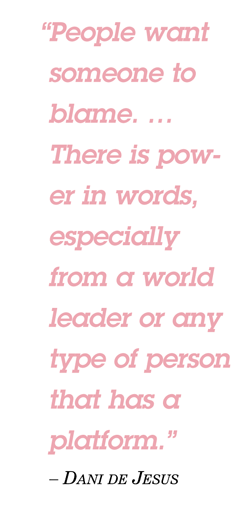
Despite the violent and ignorant nature of the crimes towards Asians, de Jesus felt it was inevitable due to the prominence of the figures promoting racist rhetoric towards Asians. “There is power in words, especially coming from a world leader or any type of person that has a platform.”
The hate—seemingly new—can actually be interpreted as a build-up of anti-Asian attitudes over the past century. It’s not that long ago during the 1920s there were signs in Stockton, California saying “No Filipinos Allowed.” The 1882 Chinese Exclusion Act prohibiting immigration by Chinese laborers was only repealed in 1943. De Jesus affirms “It’s not new… The hate and resentment towards the Asian American community isn’t anything new but now you’re seeing people reporting it more and because we had a direct correlation again to what was happening in the world.” Like Noelle, de Jesus recognizes the spotty areas of the media’s coverage of Asian hate crimes that leave the community to spread knowledge of the hate they face themselves. “The media wasn’t covering the anger present so it was really up to the Asian community itself as well as celebrities who called attention to it… Why aren’t our stories important enough for the media to take on?”
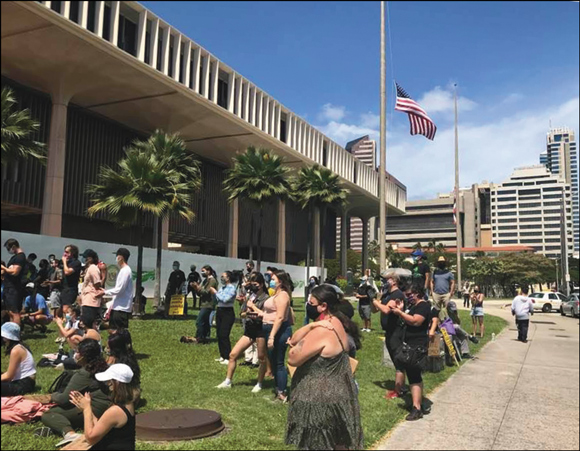
Photo: Wayland T. Quintero
Recently, Asian American celebrities like Cheryl Burke of Dancing With the Stars fame have taken to social media to promote the Stop Asian Hate movement. “No matter what, I am so PROUD to be a Filipina-American and I stand with my fellow Asian Americans/Pacific Islander’s community and anyone else of any race who agrees that this has to stop,” posted Burke on her Facebook page. “Together, I know that even if you are not Asian American, you can still use your voice and we can ALL stand together as human beings, and do so with love instead of fear. Let’s keep telling our personal stories, using our voice and continue to educate our kids, loved ones, and strangers! Remember, WE ARE STRONGER WHEN WE ARE TOGETHER!” Comedian Jo Koy also supports Burke’s involvement in the Stop Asian Hate movement, saying “Sometimes ignorance separates us and it doesn’t need to be that way.”
De Jesus attributes the anti-Asian attitudes faced to the lack of education of the framework of America—immigrants. With citizens from all over the world seeking refuge and an opportunity to thrive, the amount of education Americans receive about other cultures and their presence in America is vastly limited. “We are a country of immigrants and different cultures but nobody studies internment camps, the Filipino veterans who fought in the war denied their pensions, the plantations in Hawai‘i or even the reason why Filipinos speak English is that the Philippines was colonized by the United States,” de Jesus says.
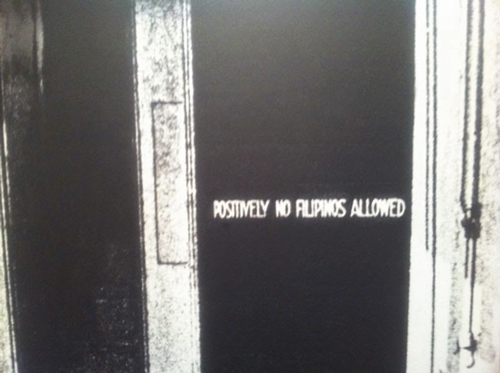
Image courtesy Alfredo Evangelista
As someone who previously lived on Maui and currently lives on the mainland, there’s a huge difference in the tensions faced in both places. De Jesus, who recently went on a road trip from Los Angeles to Idaho was confronted with fear for her safety on the behalf of loved ones. As a seasoned solo traveler, this is something she never had to deal with. “It’s very, very rare that I’m afraid… and then Atlanta happened and everyone in my sphere was impacted and fearful. Women in particular were asking themselves ‘How do I go outside?’ ” It’s safe to say the Asian hate crimes have not made life easy for Asians residing on the mainland.
Though all are disappointed by the outcomes of the generalization and resentment towards the Asian community, de Jesus is determined to change America’s cultural awareness one story at a time. Currently working on a documentary with her sister spotlighting the presence and dispersal of Filipino gangs in Los Angeles, de Jesus found deep roots connecting that to immigration policies which made marks on the Filipino-American experience. “What we’re trying to do as filmmakers and I, as a forever educator, is tell our stories and this is where Stop Asian Hate comes in. It’s imperative that our stories are no longer a side note; we are no longer just monoliths. The Filipino-American experience is very different from the Chinese-American experience, the Indian-American Experience.” For de Jesus, the stories shouldn’t stop at Asian Americans; all cultural groups in the United States should be telling their stories and receiving the spotlight they deserve as the framework of the country.
In this time filled with emotions for the Asian community in America whether those emotions be anger, sadness or terror, it is pivotal for everyone to support each other whether Asian hate be present in the islands or not. It is in the divisive nature of the past of this country and even the world that keeps many in the mode of hatred. As the pioneers of the future, it is this generation’s responsibility to hold others accountable and make America the place everybody claims it to be–a haven for diversity, success and opportunity.
 Alexis Joy Viloria, a Maui High School Senior, is the founder and President of the SaberScribes journalism club and Vice President of the Silversword Chapter of the National Honor Society. Alexis is a member of HOSA-Future Health Professionals as the Secondary Representative of the Hawai‘i HOSA State Council. She will be attending Stanford University in the Fall to major in Anthropology. Alexis is the daughter of Alex and Juvy Viloria.
Alexis Joy Viloria, a Maui High School Senior, is the founder and President of the SaberScribes journalism club and Vice President of the Silversword Chapter of the National Honor Society. Alexis is a member of HOSA-Future Health Professionals as the Secondary Representative of the Hawai‘i HOSA State Council. She will be attending Stanford University in the Fall to major in Anthropology. Alexis is the daughter of Alex and Juvy Viloria.
